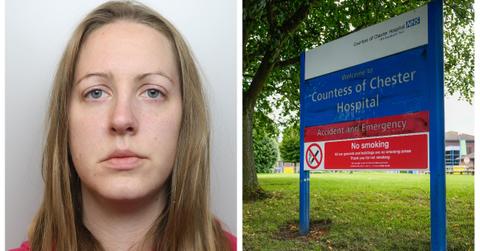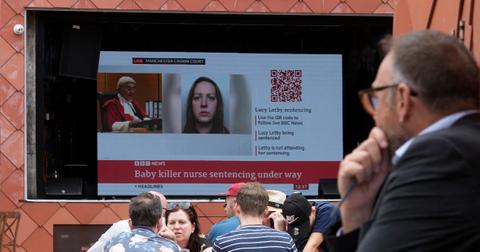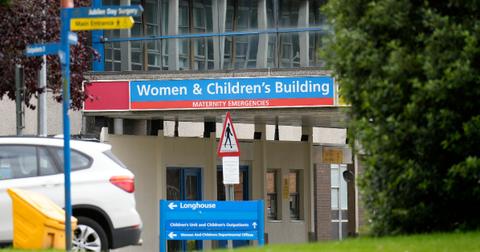Lucy Letby Murdered Seven Babies While Working as a Nurse — Could She Be Innocent?
The hospital were Lucy Letby worked was underfunded while its staff was overworked. Police failed to consider systemic issues.
May 14 2024, Published 10:45 p.m. ET

When Lucy Letby, a neonatal nurse in the United Kingdom, was found guilty of murdering seven babies she was quickly called an angel of death. According to The Guardian, it had been "more than 30 years since [Beverley] Allitt, another children’s nurse, was given that same nickname after murdering three infants and another child in eerily similar circumstances in 1991." Grieving parents were heartbroken and angry, coworkers wondered how they missed the signs, and Letby was sentenced to life in prison.
Throughout the numerous investigations conducted by the hospital and then by police, some people weren't convinced that Letby was behind these horrific crimes. Beyond the fact that no one could point to any previous instances of mental illness or violent behavior, Letby herself was deeply committed to her job. In May 2024, The New Yorker published a well-researched piece that asked the question, could Lucy Letby be innocent? This wouldn't be the first time someone was wrongfully convicted.
Is Lucy Letby innocent? Some people think it's possible.
For her piece in The New Yorker, reporter Rachel Aviv poured through "7,000 pages of court transcripts, which included police interviews and text messages, and from internal hospital records that were leaked to her." If you listen to this piece, it will take over an hour, which shows the strength of this research.

What it specifically looks at is all the moving parts that weren't connected at the time of the incidents, investigations, and Letby's trial. Together they posit that the deaths of the babies were possibly accidental.
Between June 2015 and June 2016, there was a cluster of seven deaths at the Countess of Chester Hospital where Letby was a neonatal nurse in the intensive care unit. The only compelling "evidence" investigators had, was the fact that Letby was a common denominator but at times, was tenuous. Investigators ignored the systemic issues that were already present before she began working at the hospital.
Countess of Chester Hospital was rundown and in need of funds. The neonatal unit had been in operation since 1974 and was "outdated and cramped." Stephen Brearey, the head of the unit, told the Chester Standard that, "Neonatal intensive care has improved in recent years but requires more equipment which we have very little space for. The risks of infection for the babies is greater, the closer they are to each other."
The staff was overworked and often showed up sick. A survey conducted in 2015 revealed that "more than 1,000 staff members at the Countess, about two-thirds, said that they had felt pressure to come to work even when they were ill." One woman who had recently given birth, took note of a nurse with a cold reaching into her baby's incubator. There are records of numerous mistakes being made at the hospital due to exhausted staff.
When staff grew concerned about Letby, she was shifted to an administrative role.
Upon examining the deaths of the babies, Aviv found that none could point directly to Letby and only her. In some cases, the hospital had to send a baby to a different hospital because Countess couldn't provide adequate care. In another instance, Letby was asked to care for two infants when hospital policy stated a nurse should only care for one. Staff members were worked to the bone and were often found crying out of exhaustion or frustration.
When neonatal-unit manager Eirian Powell conducted a review after staff pointed out Letby was often a common denominator, she "devised a document to reflect the information clearly and it is unfortunate she was on, however each cause of death was different.” Despite this assessment, Letby was moved to an administrative role in September 2016.
During this time, the "Royal College of Paediatrics and Child Health spent two days interviewing people at the Countess." They were shocked by the inadequate medical staff and while they were already aware of the rise in infant mortality rate in 2015. However, they pointed out that this wasn't limited to the neonatal unit. They also found that there was no obvious link between Letby and the deaths of the infants. Plus, much of the staff was angry about the fact that she was no longer working with them.
Letby filed a grievance against the hospital in January 2017 which was upheld. Unfortunately by this time, Ravi Jayaram, the head of the pediatrics department, had taken his concerns to the police with the hospital's permission. Letby was arrested once in July 2018, again in 2019, and a final time in November 2020. That final time, she was denied bail.

The case against Lucy Letby relied heavily on statistics, which is very flawed.
Aviv spoke with William C. Thompson, one of the authors of the Royal Statistical Society report and an emeritus professor of criminology, law, and psychology at the University of California, Irvine, who told her that "medical-murder cases are particularly prone to errors in statistical reasoning because they 'involve a choice between alternative theories, both of which are rather extraordinary.'" One is that this is all a coincidence while the other suggests Letby woke up one day and decided to become a serial killer.
Relying on statistics, in other words, the likelihood of Letby being present at every death but not involved isn't accurate. Burkhard Schafer, a law professor at the University of Edinburgh, said the prosecution failed to make sure their statistical figures were correct.
Police approached this case in a very black and white way and neglected to consider all that was involved such as the many issues with the hospital and its staff. Instead, they said statistically, what are the odds one woman was present at every death? That isn't good police work.